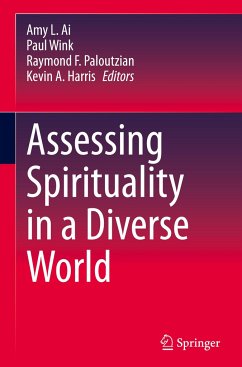
Religious Indifference
New Perspectives From Studies on Secularization and Nonreligion
Herausgegeben: Quack, Johannes; Schuh, Cora
Versandkostenfrei!
Versandfertig in 6-10 Tagen
76,99 €
inkl. MwSt.

PAYBACK Punkte
38 °P sammeln!
This book provides a conceptually and empirically rich introduction to religious indifference on the basis of original anthropological, historical and sociological research.Religious indifference is a central category for understanding contemporary societies, and a controversial one. For some scholars, a growing religious indifference indicates a dramatic decline in religiosity and epitomizes the endpoint of secularization processes. Others view it as an indicator of moral apathy and philosophical nihilism, whilst yet others see it as paving the way for new forms of political tolerance and sol...
This book provides a conceptually and empirically rich introduction to religious indifference on the basis of original anthropological, historical and sociological research.
Religious indifference is a central category for understanding contemporary societies, and a controversial one. For some scholars, a growing religious indifference indicates a dramatic decline in religiosity and epitomizes the endpoint of secularization processes. Others view it as an indicator of moral apathy and philosophical nihilism, whilst yet others see it as paving the way for new forms of political tolerance and solidarity.
This volume describes and analyses the symbolic power of religious indifference and the conceptual contestations surrounding it. Detailed case studies cover anthropological and qualitative data from the UK, Germany, Estonia, the USA, Canada, and India analyse large quantitative data sets, and provide philosophical-literary inquiries into the phenomenon. They highlight how, for different actors and agendas, religious indifference can constitute an objective or a challenge. Pursuing a relational approach to non-religion, the book conceptualizes religious indifference in its interrelatedness with religion as well as more avowed forms of non-religion.
Religious indifference is a central category for understanding contemporary societies, and a controversial one. For some scholars, a growing religious indifference indicates a dramatic decline in religiosity and epitomizes the endpoint of secularization processes. Others view it as an indicator of moral apathy and philosophical nihilism, whilst yet others see it as paving the way for new forms of political tolerance and solidarity.
This volume describes and analyses the symbolic power of religious indifference and the conceptual contestations surrounding it. Detailed case studies cover anthropological and qualitative data from the UK, Germany, Estonia, the USA, Canada, and India analyse large quantitative data sets, and provide philosophical-literary inquiries into the phenomenon. They highlight how, for different actors and agendas, religious indifference can constitute an objective or a challenge. Pursuing a relational approach to non-religion, the book conceptualizes religious indifference in its interrelatedness with religion as well as more avowed forms of non-religion.












